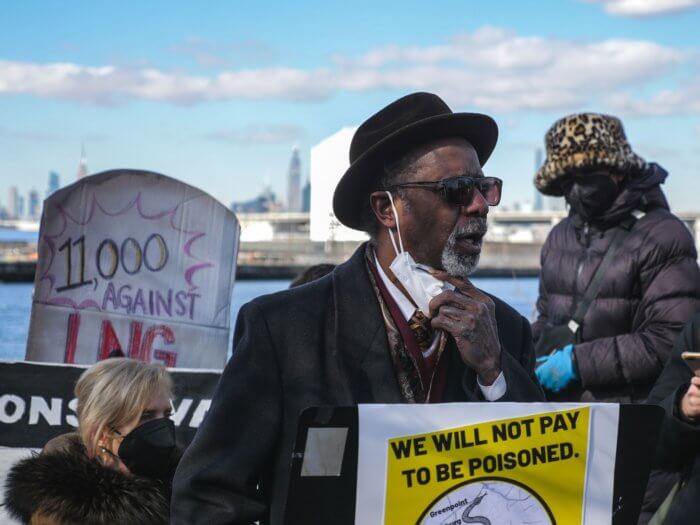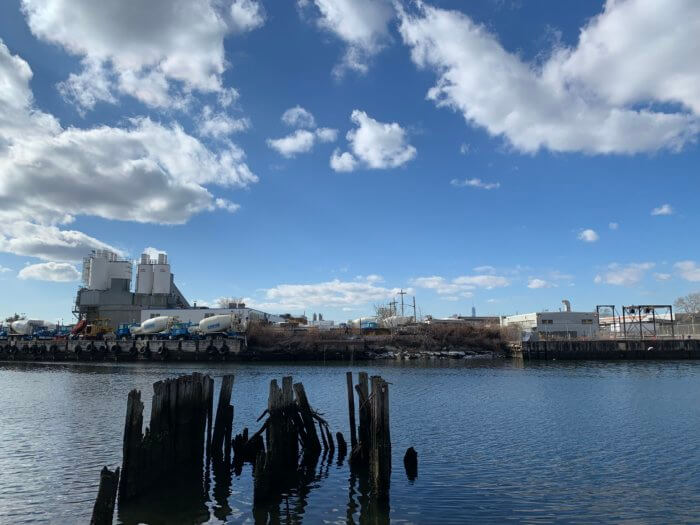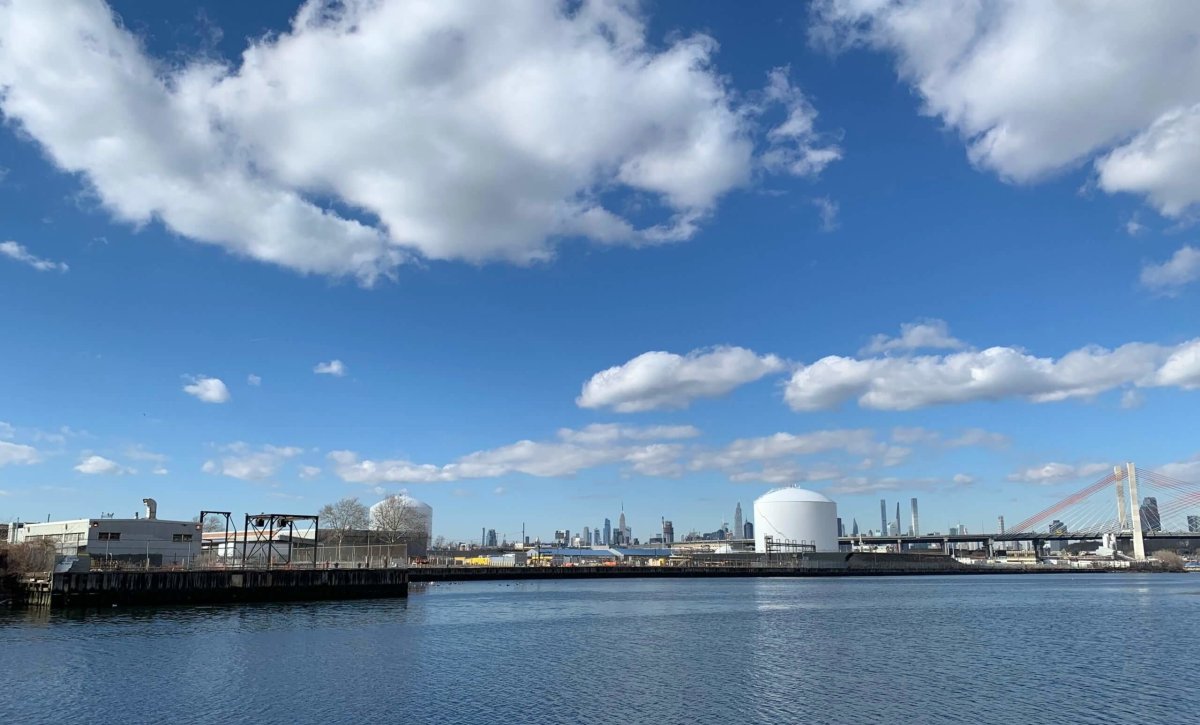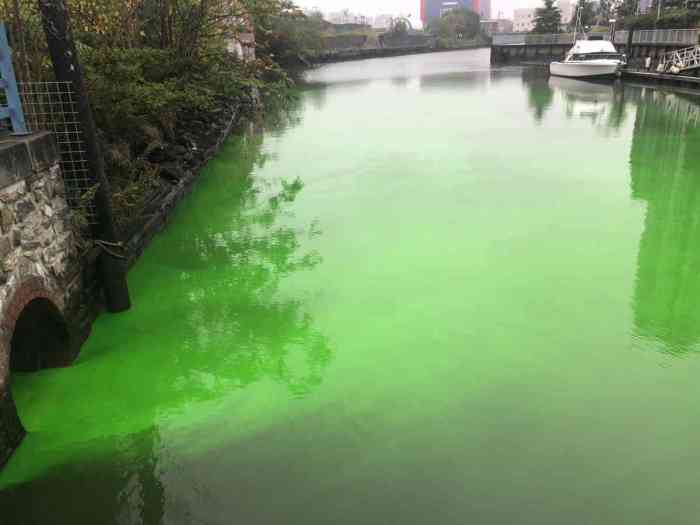With just over a week to go before the state Department of Environmental Conservation plans to issue its decision on allowing the construction of new fossil fuel infrastructure at the Greenpoint Energy Center, Brooklyn activists, neighbors, and elected officials gathered to ask Gov. Kathy Hochul to put a stop to the project.
A year and a half ago, National Grid, one of the city’s most prolific energy companies, applied for less restrictive state air pollution permits — the last step in the agency’s bid to build two new Liquified Natural Gas vaporizers at the massive campus.
The two new vaporizers would join a fleet of six 54-year-old vaporizers already operating at the North Brooklyn facility. Once approved and constructed, National Grid has said that the newer, more-efficient vaporizers would allow them to slowly phase out two of the older mechanisms.
After several delays, DEC reps are expected to issue their decision on Feb. 7.
Greenpointers who have spent their lives beside the plant and lawmakers say the vaporizers — no matter how efficient — are unnecessary, harmful to the health of people and the environment, and the detrimental to the lofty goals for emissions reduction set by the 2019 Climate Leadership and Community Protection Act.
“National Grid has yet to show any real need for these LNG vaporizers, but still they charge ahead with more and more investments in climate-killing technology, instead of going to green technology,” said US Rep. Carolyn Maloney. “We are steps away from the Newtown Creek, an EPA Superfund, looking over at Cooper Park [Houses] and the North Brooklyn communities that have long been burdened with the toxic legacy of our nation’s industrial past.”
Residents of Cooper Park Houses and the surrounding communities worry that exposure to the contaminated air and ground in Greenpoint has caused long-term health issues.
“Please, let’s not have this vaporizer installed 1,000 yards away from my community, our community, where we live,” said Elisha Fye, president of the Cooper Park Residents Council. “We need to breathe clean air, we need clean air in our lives.”

National Grid says the new vaporizers are necessary to meet the needs of the city on freezing days, though the existing vaporizers have been used sparingly in recent years, often only powering on for a few days. They say the new vaporizers will not increase the capacity of LNG stored at the Greenpoint Energy Center, but will re-gasify what is already stored there faster and more efficiently.
Activists and climate scientists have called into question National Grid’s assessment of the environmental impact of the project, and have criticized the company and government agencies for weighing the impact of the vaporizers separately from both the rest of the existing 100-acre Energy Center and the seven-mile natural gas pipeline the company constructed in Brooklyn.
Last fall, the DEC denied permits for natural gas plants in Newburgh and Astoria because they did not comply with emissions restrictions set by the CLCPA and could not justify that the need for the projects was great enough to warrant approval. In December, Eastern Generation voluntarily scrapped their plans to build new plants in Gowanus Bay in favor of developing renewable energy technologies instead, saying the permitting process had already been too challenging.
“Governor Hochul has done the right thing in Astoria, she has done the right thing in Gowanus,” said local Councilmember Lincoln Restler. “She is stopping peaker plants, and she is standing up for the fight for environmental justice. We need her help here in Greenpoint. We should be shuttering fossil fuel infrastructure, not expanding it.”
If National Grid intends to operate the new vaporizers for as long as they’ve run the existing ones, they will soon be violating the CLCPA, said Lee Ziesche, an organizer with the Sane Energy project, as New York aims to reduce its fossil fuel reliance almost entirely by 2050.

“These would definitely become stranded assets,” she said.
On Wednesday, lawyers representing a group of community organizations who last year filed a civil complaint alleging that National Grid, the DEC, and the state’s Public Service Commission had violated civil rights law sent a new filing to the federal Department of Transportation and the EPA, who are investigating the claim.
The filing doubles down on the groups’ request for DEC to rescind their “negative declaration,” which stated that the proposed vaporizers would not have a negative environmental impact, and calls for the department to conduct a full environmental review of the project before any permits can be issued.
“Issuing this air permit would without an environmental review of the pipeline with the Greenpoint LNG vaporizer expansion be a clear violation of state law and Title VI and significantly endanger the health, safety, and well-being of local residents by allowing toxins to infiltrate neighborhoods already burdened by high rates of asthma,” said Anjana Malhotra, one of the attorneys on the case.
Standing on the banks of Newtown Creek, Lor Malotra-Gaudet, a communications coordinator with the Newtown Creek Alliance, said the government needs to take real action or risk making the work of organizations like theirs redundant.
“We can’t clean up the waterways, and we can’t clean up our soil with our plants and bring back communities for our birds and our little mollusks and stuff — they’re not going to be able to live in our water if it continues to stay polluted,” they said. “All of our work on the ground isn’t going to do anything if we keep building fossil fuels.”
National Grid did not immediately respond to a request for comment.























